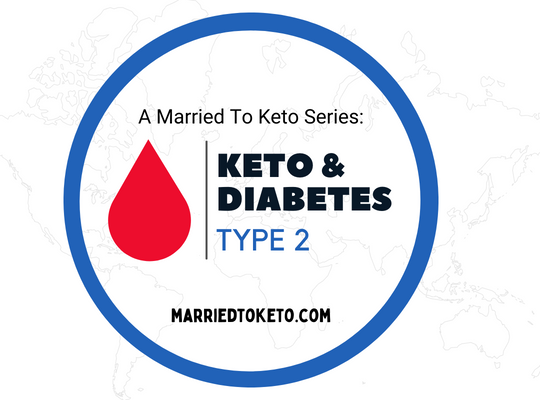Bill and I recently watched a documentary on keto (I know, we’re wild) and it was talking about using keto as a way to control diabetes. Since keto controls the amount of insulin your body needs, it seems like a no-brainer that those with diabetes should be on a keto diet. I started wondering how solid that research is, so I’m writing a series of blogs on diabetes and keto.
The Role of Insulin
Insulin is a hormone that the body uses to allow sugar into the cells to produce energy. Our pancreas makes it and pushes it out into the bloodstream. The insulin opens the door to our cells for sugar to go in and this gives us energy. Because the insulin is helping sugar go into the cells, there isn’t as much sugar in our bloodstream. As the amount of sugar in our blood lowers, the amount of insulin decreases.
Type 2 Diabetes
Type 2 diabetes is when there is too much sugar in your bloodstream. This happens when your pancreas can’t produce enough insulin or your cells don’t respond well to the insulin so the cells take in less sugar.
Many of the symptoms are very similar to type 1 diabetes. They include an increase in thirst, an increase in urination, increased hunger, and unintended weight loss. Other symptoms include fatigue, blurred vision, frequent infections, and slow healing sores. You may also experience a numbness in your hands and feet. Some of your skin may also darken, particularly your armpits and neck.
Being overweight or obese is one of the main risk factors leading to type 2 diabetes. Your risk of developing it gets higher the older you get. If you have people in your family with it, your risk is also greater.
Why are Type 2 Diabetes and Keto Linked?
When you have type 2 diabetes, most health professionals will tell you to turn to a low carb diet. Now, often they don’t say “keto” because that’s not acceptable yet. But, they do tell you to limit your carbs, eliminate sugar from your diet, and eat more protein and healthy fats. Wait a minute…that sounds a lot like keto!

The consequences of not changing your diet are severe. Type 2 diabetes can increase your risk of heart disease and stroke. You can have nerve damage in your limbs, which can eventually lead to a need for amputation. Kidney disease, eye damage, and hearing impairments are also an increased risk with this disease.
Low carb diets (including keto) can lessen the effects of type 2 diabetes and even reverse some effects. I don’t have all the scientific research at my fingertips. Personally though, I know people who have started keto and were able to stop their medication for type 2 diabetes.
The Risks of Diabetes and Keto
Like I said, people with type 2 diabetes often go to a low carb diet on the advice of health care professionals. That being said, the amount of carbs someone can and cannot take in should be a discussion with those professionals. It is a moving target, and should be watched carefully by you and your doctor.
The only real risk of using keto to treat type 2 diabetes is if you start and stop keto constantly. If your weight yo-yo’s up and down, it can make symptoms of type 2 diabetes worse. If you’re going to do it, you have to commit to it.
The Different Kinds of Diabetes and Keto
It’s important to just remind people that type 2 diabetes is very different from type 1. Keto can be helpful for both, but type 1 is not something people have any control over getting. I was well on my way to developing type 2 diabetes before keto. Doctors kept checking my blood glucose levels, and just waiting for me to have high sugars in my bloodstream. With my sweet tooth and love of sugar, it was just a matter of time.
Once someone is diagnosed with type 1 diabetes, it is permanent. There is no going back, or reversing any effects. You can change the amount of insulin you require through diet, but you will still have many of the risk factors. Type 2 is very different because it is something we often do to ourselves. No blame here, but if we can do it to ourselves, we can often undo a lot of the damage.
My Final Thoughts on Diabetes and Keto
Type 2 diabetes is often seen as a fat person’s disease. People have no empathy for it, because people think it is something people do to themselves. And, in some ways, it is. But, with all the misinformation out there and the jobs we have to do that involve lots of sitting, it’s not all our fault. To me, keto is just a way to counteract all those factors and keep us healthier.
Wendy





